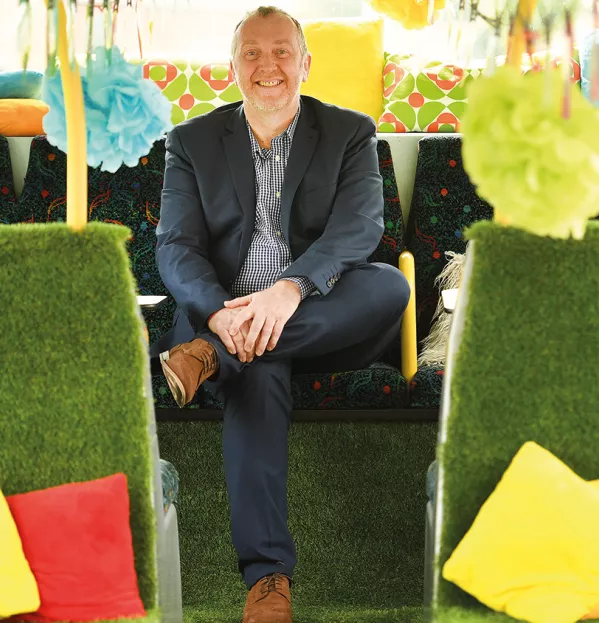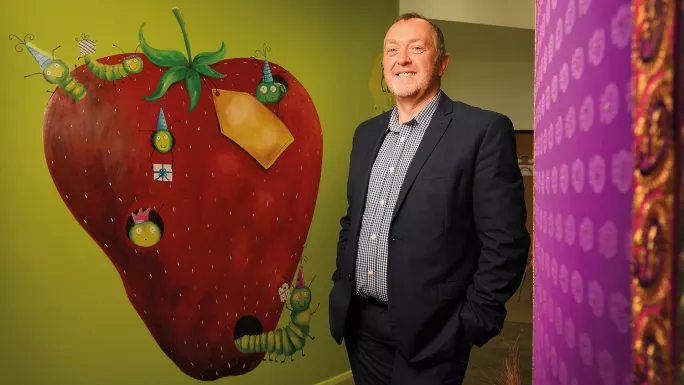‘I’ve always liked tough schools - leafy suburb schools are for other people’

When Sir Steve Lancashire became one of the pioneers of the primary school academy movement, he was bewildered to suddenly find himself cast as the “bad guy”.
As a headteacher, he had a record of helping to turn around troubled schools, and he founded the REAch2 academy trust in 2012 to provide a more structured environment for school improvement.
“In Staffordshire, I was standing up to a sea of yellow Anti-Academies Alliance T-shirts,” he recalls. “In Deptford, I was having my car covered in dog excrement and the wheels slashed; being sworn at and, on one occasion, spat at. The whole politicisation of it was unexpected.”
The first couple of years of setting up REAch2 were, he admits, “really difficult”.

“You have gone from, ‘You are helping all these schools to succeed and you are a good guy,’ to suddenly, ‘You’re a fat cat CEO - we don’t like you,’ almost overnight,” he says. “That was really shocking to me.”
But Sir Steve most definitely doesn’t resemble your typical academy trust CEO. While most of his peers take supreme care to present themselves as the sensible corporate professional, Sir Steve takes himself less seriously, occasionally letting slip humorous off-colour asides while chairing education conferences with the sector’s great and good.
Name of the game
On his Twitter profile, he describes himself as “often irreverent, probably irrelevant, working on irredeemable”, and has posted pictures of a herd of pygmy goats he has recently bought, which will be named after either male Jane Austen characters or boybands. The final decision will be left to the social-media-savvy pygmy goats at Varndean School in Brighton.
REAch2 is now one of the biggest players in the academy system. Its 55 primary schools make it the largest primary-only chain, and Sir Steve was knighted in 2016.
It is a long way from his upbringing in a “very small village” near Sheffield, where his father was a miner who worked his way up to be manager of the pit, and his mother a dinner lady. “A tough old place” is how Sir Steve characterises it now. “I wasn’t a natural fit. Even then I was kind of flamboyant, I was kind of mouthy, and I think, on occasion, Dad took a fair bit of stick for having a son who was fairly out there.
“But he was absolutely passionately determined I was not going to go down the pit and was going to succeed.”
He went to “a terrible couple of schools”. His primary “loved you to death, but you learned nothing”, and his dad had “constant run-ins with secondary school for six years because he felt they weren’t giving me the kind of education I needed”.
Sir Steve credits his father, who tutored him at home almost every night, for his progression to university. He says that his career choices ranged from joining Abba - which did not happen - to becoming a lawyer, or following his older sister into teaching. In the end he opted for the latter, and knew “immediately” that he was going to be a headteacher “as quick as I could”, reaching his goal by the age of 30.
Growing up, he was always open about his sexuality, something that he says was “tough” for his father, and he experienced verbal and physical bullying. It was something that, he says, “made me strong today”. He adds: “It is strength through adversity. It was tough.”
Being an openly gay headteacher could be equally difficult. Sir Steve recalls “occasions when I was first a headteacher, and right across the playground one of the parents shouted, ‘Oi, gay boy’.
“There was a wonderful moment where this happened and literally this person who shouted it was swarmed by a group of mums who basically took him apart.”
Then came Section 28, the 1988 law making it illegal to “promote the teaching in any maintained school of the acceptability of homosexuality as a pretended family relationship”.
For Sir Steve, it was “one of those things that tests your resolve, because it would have been much easier just to keep your mouth shut, get on with the job and not comment”. “I just could not do that,” he states. “I have always felt as an educator, as a person, it’s my job to be a role model in whatever I can do.”
But he has “never been particularly political about it,” he adds.
“I think the best way for me to be an advocate is for me to live it with integrity, and that’s what I do,” he says simply.
Sir Steve was always drawn to a certain type of school, something that he says is now in the DNA of REAch2.
“I have always liked tough schools where you can make a real difference, where the school is popular with kids full of character and problems, and I loved sorting them out and helping them,” he says.
“Leafy suburb schools and those kinds of schools are for other people - not me.”
The academies movement was originally designed to help the schools in the most dire straits - but in recent years, the emergence of a class of “untouchable” schools that no academy trust will risk its reputation to help has become one of its biggest failures.
It is an issue Sir Steve has seen through the eyes of an academy CEO and a former member of one of the headteacher boards that help make decisions about the academy system. For him, academy trusts need to recognise their moral duty to help such schools.
“This is where, as some of the country’s largest sponsors, we need to do more. There is no doubt about that,” he says bluntly.
“We have got a couple of schools in the trust where if you took a very cold look at them and said, ‘Does it make sense for these schools to be in our trust from a financial and geographical point of view?’ you would say ‘no’.
“But do those schools need to be in REAch2? Yes, they do. Our board is very clear that we have got a moral responsibility, and while the due diligence might say they shouldn’t be in our trust, it’s about the 64 kids in that school and they should be in our trust, so they are in our trust.
“I’m not sure that’s the same with all larger multi-academy trusts, but for all of them the answer should be ‘yes’ because we have got the scale, the size, the capacity, the resources.”
And for him, some of the responsibility lies with the Department for Education, by recognising that it is more costly to support schools in remote locations or with entrenched problems. “We are never awash with money and so, therefore, decision by decision, we have to make sure we are not compromising the rest of the trust by taking on schools that might be really, really too costly.
“That’s where I think the responsibility should sit with the DfE. We’ll play our bit, but actually you do need to be sensible about that and say, ‘That’s going to cost a lot of money and we need to find, from the public purse, some way to do that.’”
Money, money, money
Executive pay is another area where academies have come under increasing public scrutiny, and Sir Steve is one of the best paid academy CEOs in the country.
According to REAch2’s latest financial accounts, he was paid £240,000-£250,000 in 2016-17, including a one-off bonus from the previous year. Is he worth it?
“You have got to be able to look at yourself in the mirror and say, ‘Do I give value for money for what I earn?’ I can look myself in the mirror and I can think to myself, ‘You are responsible for 20,000 children, you have taken 60 schools, 17 per cent of which were ‘good’, and now towards 80 per cent of them are ‘good’. REAch2 has a £120 million turnover, it has an estate worth £0.5 billion’.
“I do it to the absolute best of my ability and I can look myself in the face in the morning and say, ‘Yes, you give value for money.’”
As for the future, REAch2 is working on a clutch of new free schools, and could soon become the largest academy trust, at least in terms of the number of schools.
But Sir Steve is resolute that REAch2 will always remain a primary-only trust, because he wants to ensure primaries always have the option of collaborating just with other primaries. As for his future, at 54, he rules himself out of any of the big jobs in the education world, such as the national schools commissioner post (for which a permanent post-holder is yet to be announced).
“I quite want to be an aged hippy in Australia,” he says. “So it’s either an ancient hippy on the beach in Byron Bay learning how to surf, or it’s REAch2.”
You need a Tes subscription to read this article
Subscribe now to read this article and get other subscriber-only content:
- Unlimited access to all Tes magazine content
- Exclusive subscriber-only stories
- Award-winning email newsletters
Already a subscriber? Log in
You need a subscription to read this article
Subscribe now to read this article and get other subscriber-only content, including:
- Unlimited access to all Tes magazine content
- Exclusive subscriber-only stories
- Award-winning email newsletters